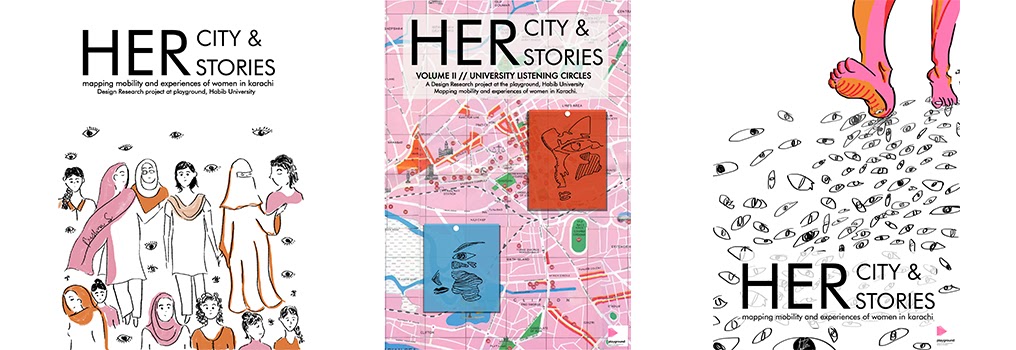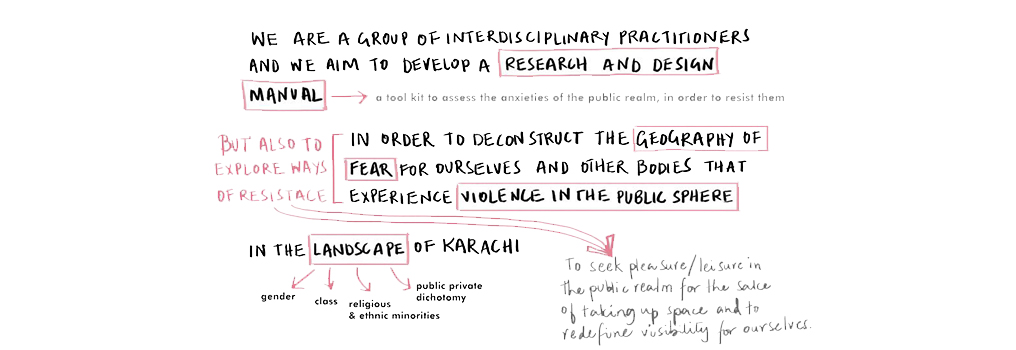 Her City, Her Stories is a student led research project that uses a range of design research methodologies, including, but not limited to the practice of human-centered design, to explore and document women’s real-life experiences with mobility in the city of Karachi. The subjects of this study are women lying in the age bracket of 16 - 30 years, from various socio-economic backgrounds, who usually travel independently, around the city.
This research is comprehensive, and examines the various different transport modes available to women in the city, to better understand the relationship between the two. A comparative study will be conducted to see how the issues faced by women in Karachi, fare against issues faced by women in other South Asian cities. Finally, the study will explore different ways of designing impactful, speculative and empathetic interventions, centered around the themes of gender and mobility.
Her City, Her Stories is a student led research project that uses a range of design research methodologies, including, but not limited to the practice of human-centered design, to explore and document women’s real-life experiences with mobility in the city of Karachi. The subjects of this study are women lying in the age bracket of 16 - 30 years, from various socio-economic backgrounds, who usually travel independently, around the city.
This research is comprehensive, and examines the various different transport modes available to women in the city, to better understand the relationship between the two. A comparative study will be conducted to see how the issues faced by women in Karachi, fare against issues faced by women in other South Asian cities. Finally, the study will explore different ways of designing impactful, speculative and empathetic interventions, centered around the themes of gender and mobility.
 As part of this initiative, the Her City, Her Stories team planned on conducting several workshops. However, given the limitations due to the Covid-19 pandemic, the team had to re-evaluate and explore options on how to make this research more accessible and inclusive, while continuing to abide by all health and safety measures. They started by hosting a series of online listening circles for women. Community and behenchara are key aspects for resisting isolation, hence the idea of these workshops is to bring women together to have a healthy dialogue about their relationship to the city they live in, to validate their experiences, and envision a city where women feel free. The team continues to work on making these listening circles more interactive and engaging.
The workshops also include different mapping exercises. The technique of Encounter Mapping is used to get a visual representation of the experiences that women have in the spaces they visit regularly, and the ways through which they adapt to the city. The second activity is conducted using Google My Maps, to mark the walking and driving routes that are part of the participants’ daily commute, with the aim of generating heat maps of safe and unsafe zones. The third activity is a speculative future’s activity conducted on Mural. Women are asked to envision their preferred future of Karachi 2050.
Moving forward, the team plans on taking into account how the pandemic has affected the mobility patterns of the citizens of Karachi, and its impact on the future of the city.
As part of this initiative, the Her City, Her Stories team planned on conducting several workshops. However, given the limitations due to the Covid-19 pandemic, the team had to re-evaluate and explore options on how to make this research more accessible and inclusive, while continuing to abide by all health and safety measures. They started by hosting a series of online listening circles for women. Community and behenchara are key aspects for resisting isolation, hence the idea of these workshops is to bring women together to have a healthy dialogue about their relationship to the city they live in, to validate their experiences, and envision a city where women feel free. The team continues to work on making these listening circles more interactive and engaging.
The workshops also include different mapping exercises. The technique of Encounter Mapping is used to get a visual representation of the experiences that women have in the spaces they visit regularly, and the ways through which they adapt to the city. The second activity is conducted using Google My Maps, to mark the walking and driving routes that are part of the participants’ daily commute, with the aim of generating heat maps of safe and unsafe zones. The third activity is a speculative future’s activity conducted on Mural. Women are asked to envision their preferred future of Karachi 2050.
Moving forward, the team plans on taking into account how the pandemic has affected the mobility patterns of the citizens of Karachi, and its impact on the future of the city.